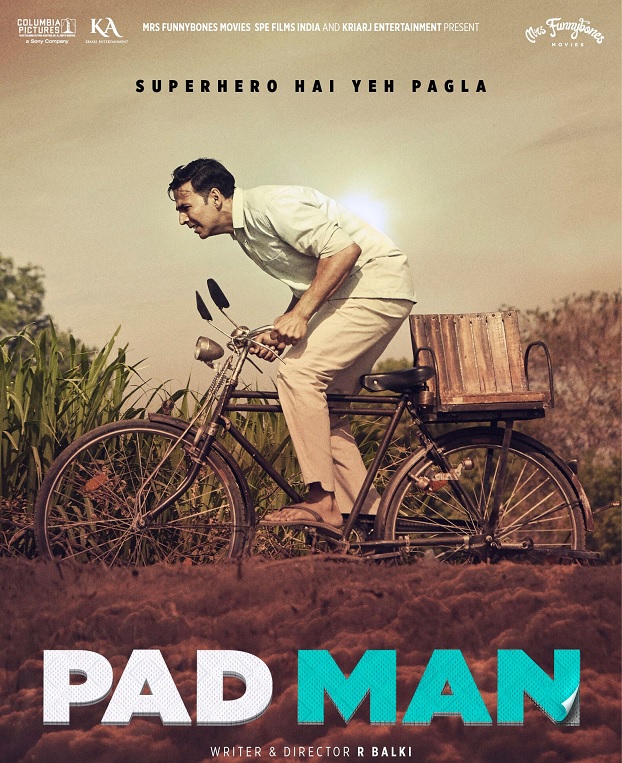
Hindi film Pad Man is based on the true story of Arunachalam Muruganantham, an Indian man credited with assembling a low cost sanitary pad manufacturing machine. It’s also Akshay Kumar’s fourth film in under two years based on a real-life person. Pad Man is told in a conventional way, and lucky for the makers, the story is unique enough to keep the film afloat and mostly engaging.
Set in the Indian heartland of Madhya Pradesh, Pad Man opens with the marriage between Lakshmi (Akshay Kumar) and Gayatri (Radhika Apte). Deeply concerned by the dirty rags his bride uses during menses, Lakshmi purchases sanitary pads for his wife. Appalled at the price tag, Gayatri asks Lakshmi to return the costly item. But a work mishap provides an opportunity for Lakshmi to speak about sanitary pads with a physician, who tells Lakshmi the importance of feminine hygiene.
It becomes Lakshmi’s mission for the women in his family, and soon enough his village and all of India, to have access to sanitary pads which are of high quality at little cost. But the hush-hush subject of menstruation brings many challenges Lakshmi’s way, mostly from those who he’s trying to help. And just when things look hopeless, a Delhi-based tabla player Pari (Sonam Kapoor) helps him get him back on track.
The Good
Akshay Kumar: Kumar brings freshness to the screen which is pleasantly surprising for an actor who has spent close to 30 years in the business. He has a huge smile on his face for a large portion of the film which could have easily appeared goofy, yet Kumar genuinely looks happy. Was this a role where he had to speak in a different dialect or need to dig deep into a complex character? No, but he certainly makes a case for the importance of charisma, good looks and focus on getting the job done.

Cinematography: Director of Photography P.C. Sreeram beautifully captures Madhya Pradesh. Sunlight sparkles on the smiles of actors in outdoor locations and the rich colors and textures of the Indian countryside look brilliant.
Subject Matter: This is the third film based upon Arunachalam Muruganantham’s life (the others being Menstrual Man and Phullu), but it’s the first starring an actor with a large brand to maintain. Forget the mysterious blue fluid used in pad ads, Lakshmi uses animal blood to test the absorbency of his pads. Seeing this unfold on the big screen and then the expression on his face as he experiences pad leakage — he has a pouch of animal blood tied to him which pushed blood to the pad — is memorable.
There are some very relevant observations in the film which ring true even for women in more developed countries such as embarrassment around the issue of menstruation and the relatively high cost of feminine hygiene products.
The Bad
One Dimensional Women: In a film about feminine hygiene, female actors are mostly sidelined and aside from Pari, appear more like caricatures than characters. The village women are straight out of central casting for Hindi teleserials and speak of honor while crying copious tears. An example is of a mother witnessing Lakshmi giving pads to her daughter and the camera zooms in and out as she yells in horror.
Rushed, sloppy second half: Like many Hindi films, Pad Man suffers from a sub-par second half. Important details are left out such as the duration Lakshmi spends exiled from home, or what Pari does, or is trained in, that makes her such an asset.
Talking down to the audience: On multiple occasions conversations are made to feel more like public service announcements than scenes from a feature film. Director R. Balki co-wrote Pad Man with Swanand Kirkire, and their dialogues are basic and largely unoriginal.
The Surprising
Amit Trivedi’s music: Since his breakout success in 2009 with Dev D, Music Director Amit Trivedi can be relied on to bring at least one song per film that hits it out of the park. While Kausar Munir’s lyrics are sweet and “Aaj Se Teri” is a decent song, the music is mediocre.
Radhika Apte: Being a darling of the indie film scene for close to a decade Apte usually leaves an impression, regardless of the length of her role, by playing interesting characters. But the one-dimensional Gayatri weeps and only talks about her husband’s name which she feels is under constant threat by his obsession with pads.
As Lakshmi asks for feedback from his customers on the efficacy of his sanitary pads on a scale of Bad, Good and Fantastic. Upon receiving comments that his creation was just as good as the brand name pads, Lakshmi’s eyes fill with tears of joy. Same is safe to assume for the makers of Pad Man who aren’t aiming for fantastic, because good is good enough.
* * *












